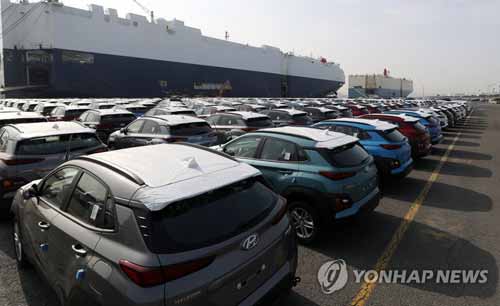Three troubles due to ‘GM situation, export decrease, commercial attack…Warning on automobile industry
Ye Jin Soo | jinye@ | 2018-04-05 11:12:07

By Yonhab News
This is the disadvantage of the Korean automobile market due to the global economic crisis in Korea, the foreign exchange rate depreciation and the FTA revision of the Korea-US Free Trade Agreement (FTA).
According to the automobile industry on April 4, the 50,000th anniversary of the Korean earthquake that began with the announcement of the closure of the Gunsan plant in February, but the GM headquarters and the union are fighting against each other without finding an exit. Even in the crisis of the bankruptcy, Korea`s GM labor unions are in the process of strikes. The National Metal Workers` Union (KMG) in Korea filed a petition for labor disputes with the Central Labor Relations Commission on February 2. The union side will decide on the strike after securing the strikes as the result of the adjustment period passed by the senior middle man for 10 days. If the decision to suspend mediation is made at the senior level, the union can strike lawfully through union votes. If the labor union strikes in a situation where Korea GM is in the process of restructuring, it is the industry analysis that the company base can collapse before the end of the due diligence of the government due to the collapse of the sales network and the worst financial situation.
The wage increase in the minimum wage has also caused the contractors to be condemned in addition to the decline in sales of GM Korea. "The second and third-tier suppliers, whose sales have fallen sharply due to a liquidity crisis due to a sharp reduction in Chevrolet sales, are also facing a huge burden of raising the minimum wage," said a representative of one partner company "If the situation is not resolved quickly.”
Also, carmakers are worried that they will give more domestic market to imported cars due to the amelioration of the safety standards for US automobiles following the amendment of the KORUS FTA. If the safety standards for US cars are relaxed, US automakers will be able to import and sell cars with no tariffs, and there is no need to spend time and money on new domestic certifications. As a result, imports from Europe and Germany, which are produced at American plants as well as US cars, are expected to increase.
Korean car exports are also declining due to the won depreciation and the delayed introduction of new cars. According to the Korea Automobile Manufacturers Association, exports of domestic cars in the first quarter of this year totaled 575,687, down 8.2 percent from the same period last year. Automobile exports also dropped 4.4 % year-on-year to USD 9.81 billion. As a result, automobile production in the first quarter decreased by 7.5 percent year on year to 9 million 2803 units, less than 1 million units.
The decline in exports is attributable to a sharp fall in the won`s exchange rate and sales delays in key markets such as the US and China due to delays in new car injections, The won-dollar exchange rate fell to 1055 won on February 2, the lowest level in three years and five months.
According to the analysis of the global management research institute under the Hyundai Motor Group, it is estimated that if the won-dollar exchange rate declines by KRW 10, domestic automobile industry sales will decrease by KRW 420 billion.
Professor Kim Pil-soo of Daerim University said, "Hyundai Motor is not yet a premium brand, but it is in the image of a mass-produced car brand. In order to improve profitability, it needs to absorb its belt, but with its strong and low-efficiency structure, Labor-management stabilization of the domestic automobile industry is more important than ever, and labor and management should increase their competitiveness through paradigm shift."
By Ye Jin Soo jinye@
